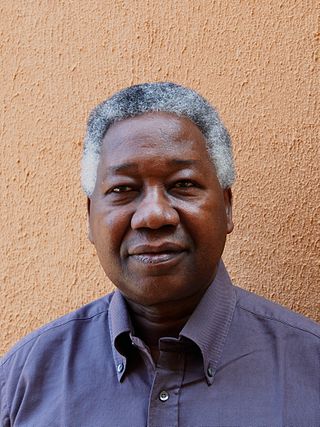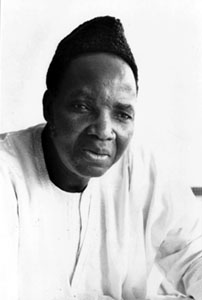Related Research Articles

The music of Burkina Faso includes the folk music of 60 different ethnic groups. The Mossi people, centrally located around the capital, Ouagadougou, account for 40% of the population while, to the south, Gurunsi, Gurma, Dagaaba and Lobi populations, speaking Gur languages closely related to the Mossi language, extend into the coastal states. In the north and east the Fulani of the Sahel preponderate, while in the south and west the Mande languages are common; Samo, Bissa, Bobo, Senufo and Marka. Burkinabé traditional music has continued to thrive and musical output remains quite diverse. Popular music is mostly in French: Burkina Faso has yet to produce a major pan-African success.

Bobo-Dioulasso is a city in Burkina Faso with a population of 904,920 ; it is the second-largest city in the country, after Ouagadougou, Burkina Faso's capital. The name means "home of the Bobo-Dioula".

Idrissa Ouédraogo was a Burkinabé filmmaker. His work often explored the conflict between rural and city life and tradition and modernity in his native Burkina Faso and elsewhere in Africa. He is best known for his feature film Tilaï, which won the Grand Prix at the 1990 Cannes Film Festival and Samba Traoré (1993), which was nominated for the Silver Bear award at the 43rd Berlin International Film Festival.
The cinema of Burkina Faso is one of the more significant in Africa, with a history that spans several decades and includes the production of many award-winning films.

The University of Ouagadougou is a university located in Ouagadougou, Burkina Faso. Founded in 1974, it was officially renamed in 2015 as l’Université Ouaga 1 Professeur Ki-Zerbo. The UO consists of seven Training and Research Units (UFR) and one institute.

Gaston Kaboré is a Burkinabé film director and an important figure in Burkina Faso's film industry. He has won awards for his films Wend Kuuni and Buud Yam.

Joseph Ki-Zerbo was a Burkinabé historian, politician and writer. He is recognized as one of Africa's foremost thinkers.

The Catholic Church in Burkina Faso is part of the worldwide Catholic Church, under the spiritual leadership of the Pope in Rome. According to the CIA Factbook, in 2018, 17% of the population are members of the Catholic Church.

Fanta Regina Nacro is well known for being the first woman from Burkina Faso to direct a feature film and is a founding member of the Guilde Africaine des Realisateurs et Producteurs. She is an artist who explores the themes of African cinema while tackling issues surrounding illness such as AIDS, and education for the girl child. She represents the "New African Wave". Nacro's films tend to question the traditions of Burkina Faso, while looking at the relationship between tradition and modernity in today's world.
Articles related to Burkina Faso include:

Football is the most popular sport in Burkina Faso. And the national association can look back on recent developments with a great deal of pride. Reaching the semi-finals of the African Cup of Nations on home soil in 1998, reaching the knockout stage for their first FIFA World Youth Championship in 2003, and appearances at two final competitions of the CAF U-17 Cup, as well as third place at the FIFA U-17 World Championship in Trinidad and Tobago in 2001 are the country's outstanding achievements at international level. The nations most famous players include Kassoum Ouegraogo, nicknamed Zico, who had his most successful seasons with Espérance de Tunis before ending his career in Germany, Siaka Ouattara, who spent his entire career with Mulhouse in France, and Moumouni Dagano, who was voted best African player in Belgium in 2001, when he played for the Belgian side Genk. He later went on to play for the French side Guingamp before transferring to another French team, FC Sochaux in 2005. Burkina Faso received an unexpected free pass into the group stage of the 2006 FIFA World Cup qualification process, when their opening round contestant, the Central African Republic, withdrew from the competition. This gave the West Africans, who were at that stage ranked 14th on the continent, the certainty that their name would be in the hat when the Preliminary Draw for the 2006 FIFA World Cup in Germany was made. They got off to a flying start, beating Ghana 1-0 in their opening match and laying down a marker for their Group 2 adversaries South Africa, Cape Verde Islands, Congo DR and Uganda. The victory train began to come off the rails with two defeats to Cape Verde, and with a record of two wins and three losses, Burkina Faso were up against it at the half-way stage. Frenchman Bernard Simondi took over the coaching reins from Ivica Todorov and made the team harder to beat at home, even recording wins over South Africa and Congo DR, but in the end it was not quite enough, and the likes of Abdoulaye Cisse, Moumouni Dagano, and Wilfred Sanou went no further in the competition.

Dani Kouyaté is a film director and griot from Burkina Faso, which the BBC describes as "Africa's most important film-making country".
Mahama Johnson Traoré (1942–2010) was a Senegalese film director, writer, and co-founder of the Ouagadougou-based Pan-African Cinema Festival (FESPACO).
The Nazi Boni University is a university in Bobo-Dioulasso, Houet Province, Burkina Faso. It is one of three public universities in Burkina Faso.
The Pan African Federation of Filmmakers, formed in 1969 and inaugurated in 1970, is "the continental voice of filmmakers from various regions of Africa and the Diaspora", it focuses on promoting African film industries in terms of production, distribution and exhibition.
The Le Balai Citoyen, is a political grassroots movement in Burkina Faso, which was part of the opposition against President Blaise Compaoré. It was co-founded by two musicians, reggae artist Sams’K Le Jah and rapper Serge Bambara ('Smockey') in the Summer of 2013. They organized several protests in early 2014, for example hosting a joint rally with the newly formed Movement of People for Progress, filling a 35,000-capacity sports stadium to its rafters.
Aminata Ouédraogo is a Burkinabé filmmaker and administrator. She is general coordinator of the Pan-African Union of Women in the Image Industry (UPAFI).
Patrick Gomdaogo Ilboudo was a writer from in Ouagadougou, Burkina Faso.

Kady Traoré is a Burkinabé actress, film director, and film producer.
Moustapha Ndoye was a Senegalese photographer, film director and screen writer.
References
- 1 2 3 "Pierre Ernest Rouamba Film director Producer Assistant director". africine.org (in French). Fédération africaine de la critique cinématographique (FACC) q. 2020. Retrieved 28 September 2023.
Né le 29 juin 1951 à Bobo Dioulasso (Burkina Faso), Pierre Rouamba est diplômé de l'Institut africain d'Éducation cinématographique (INAFEC). Régisseur. Coordinateur en 2000 de la Fepaci. Réalisateur TV. Co-fondateur de la société de production ClapAfrik, il a exercé les fonctions d'assistant réalisateur sur plusieurs longs métrages (Paweogo, l'émigrant de Kollo Daniel Sanou, Wendemi de Pierre Yaméogo...) et a réalisé de nombreux courts métrages.
- 1 2 3 "Pierre Ernest Rouamba. Réalisateur/trice, Producteur/trice, Assistant/e réalisateur (Homme) Burkina Faso". africultures.com. Africultures, Les mondes en relation. Retrieved 28 September 2023.
- 1 2 Pierre Rouamba at IMDb.
- ↑ "MOYEN Métrage 2007. Droit de mémoire". africultures.com. Africultures, Les mondes en relation. Retrieved 28 September 2023.
Les anciens combattants africains, autrefois appelés Tirailleurs sénégalais, une fois démobilisés de l'armée coloniale française après les campagnes de 14-18, de 39-45, d'Indochine, d'Algérie et des autres campagnes coloniales, ont tout simplement été oubliés. (Translation: African veterans, formerly called "Senegalese Tirailleurs", once demobilized from the French colonial army after the campaigns of 14-18, 39-45, Indochina, Algeria and other colonial campaigns, have simply been forgotten.)